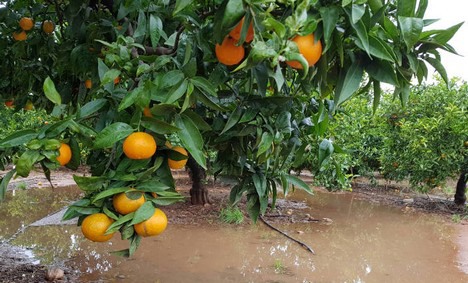Thousands of tons of mandarins and oranges could be left unharvested due to the delays in the market this season and the poor demand, as well as the impact of the shippers' strike and the fact that it has been one of the rainiest months of March in living memory. This situation is causing a shortage of citrus fruit at the moment. It is also expected that a large amount of fruit will be affected by excess moisture.

The strike that was called last week in Spain by part of the transport sector, which has resulted in serious incidents taking place on the roads, has been causing severe delays in the arrival of the trucks carrying citrus from Andalusia and Murcia to the packing centers mainly located in the Region of Valencia, where 70% of the national production is handled and marketed, and where it has been raining intermittently for about two weeks.
"It has been raining intermittently for about two weeks and it is impossible to go out to harvest the fields. In these last two days, it looks like we've been getting all the rain that should have fallen in a whole year," says José Ramón Mechó, manager of Agribur, a citrus producer and marketer based in La Vall d'Uixó, Castellón, one of the provinces where it has been raining the most and which produces the most clementines and mandarins. "The chambers of the central handling plants are empty, and it is also impossible to plan the volumes to extend the campaign until the end of April. Some farms are more affected than others, but there will surely be significant losses," he says.
"In our plantations we have already recorded 350 liters of rain per square meter so far in March, and the weather forecast says that it will continue to rain for the next ten days," says Juan Bautista Juan, commercial director of Frutas Tono, in Tavernes de la Valldigna, Valencia. "Last week, we were also unable to harvest in Valencia and although it was possible to harvest in Andalusia, the shippers' strike prevented most of the fruit from reaching the Valencian plants. The result is a lack of stocks and shortages in the markets, where it is impossible to meet all orders."
It is still too early to know how much of an impact the rainfall will have on the fruit's quality. "A lot of fruit will be lost, and much of the fruit that will be saved is not guaranteed to meet the expected standards on their arrival at the markets," says Juan Bautista. "That is why it would be advisable, once the rains are over, not to harvest immediately, and to first evaluate the fruit's condition. However, I fear that this will not happen, given the huge pressure from the demand, now that there is hardly any harvested fruit, and the accumulated losses caused by this year's bad prices."
Orange prices have been dramatically low this year since the arrival of the first Navelinas. The trade of second season mandarin varieties also started with lower figures than in previous years, and with an even more drastic drop from February onwards due to a reduction in the demand and a historically high supply, with an abundance of low sizes.
"Many orange farms have stopped harvesting due to the market conditions, and the harvest has also been interrupted due to the impact of the rains. The economic losses for growers and marketers this year are huge. Inputs, packaging materials and fuel have become so expensive that it is becoming unsustainable to produce. The situation is severe. Surely, many producers are going to abandon their fields next year, and many of those trying to stay won't be able to invest enough to offer the same quality standards," says the commercial director of Frutas Tono.
